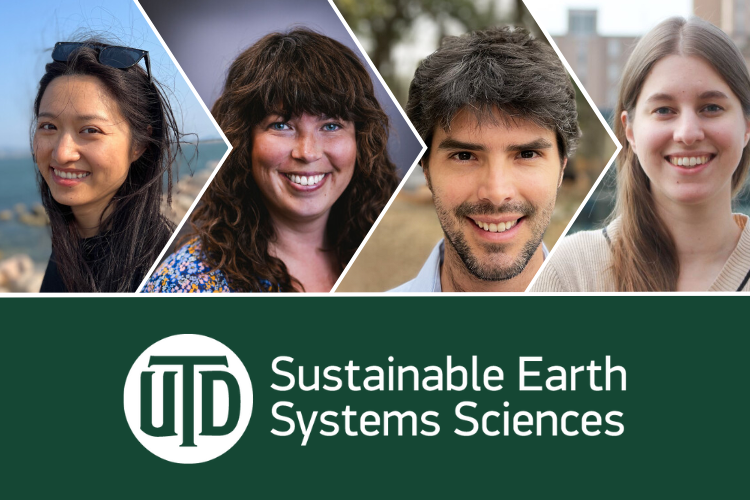By Caryn Berardi
March 26, 2024

The Department of Sustainable Earth Systems Sciences (SESS), previously named the Department of Geosciences, is driving a new vision that aligns itself with a larger purpose: understanding and safeguarding the planet’s future.
The name change is just one component of a broader mission to not only better reflect the department’s wide range of subject areas, but to attract new faculty, research funding, students and employers seeking graduates with modern Earth-science skills.
“To the general community, the term ‘geosciences’ indicates Earth is more about the past or present,” said Dr. Yujie Zheng, assistant professor of geophysics. “Having ‘sustainability’ in our department name emphasizes our work’s focus on the future.”
Zheng is part of a new tenure-track faculty cohort recruited over the last two years. Together, they are helping to propel the department forward in modern Earth science curriculum and research.
Addressing Critical Environmental Challenges
After completing a PhD from Stanford University and postdoctoral work at the California Institute of Technology, Zheng came to UT Dallas in fall 2023 to research earthquake hazards and groundwater reservoirs using radar remote sensing techniques.
Groundwater, found in rocks and soil beneath Earth’s surface, is the planet’s largest reservoir of fresh, liquid water. In the United States, it provides drinking water for about half the total population, and over 50 billion gallons per day are used for agricultural purposes, according to the U.S. Geological Survey.
Excessive and unregulated pumping has resulted in groundwater depletion across the nation. Moreover, traditional methods to measure and monitor groundwater storage – such as drilling wells – are sparse and expensive, according to Zheng.
“Radar is a more efficient, non-invasive way to study reservoirs,” she said. “It gives us a big-picture view about groundwater across large areas. Essentially, you’re replacing wells with millions of good data points.”
Zheng and her colleagues’ green research initiatives are helping to answer scientific questions, but their insights may drive policies and strategies aimed at preserving natural resources.

Assistant professor Dr. Zachary Sickmann was drawn to the department’s new vision when he joined SESS in fall 2022 after completing his PhD at Stanford and fellowship at The University of Texas at Austin. With a background in sedimentology, he and his team recently designed a new tool to address the growing global demand for sand.
Sand is the most extracted solid material on Earth, but issues like illegal mining and ecological damage are raising concerns about scarcity and potential long-term impacts.
“We live in a world of concrete, and concrete is mostly made of sand and gravel,” Sickmann said. “My team is researching how this high-volume extraction of sand is impacting natural systems, and we’re working to improve methods to track, trace and monitor sand from its source to commercial end use.”
Recruiting the Next Generation of Earth Scientists
Shedding light on a critical yet overlooked sustainability issue, Sickmann wants to connect with students who come to college in hopes of changing the world.
“I think this generation of students is the first generation that has grown up knowing they’re going to face climate change and environmental challenges,” he said.
Assistant professor Dr. Nadine Igonin, a geophysicist focusing on man-made earthquakes, was recruited in fall 2023 and researches various aspects of fluid injection and seismic monitoring. Understanding, managing and mitigating these earthquakes is key to moving toward a sustainable future, she said.
“Our students need to see that there are real-world solutions to the challenges our society faces, and that they can contribute to those solutions,” said Igonin, who earned her PhD from University of Calgary and completed a fellowship at UT Austin. “We want them to be inspired and energized knowing that they can make a real difference using Earth science.”
For master’s student Madigan Blake BS‘23, who was an undergraduate researcher in Sickmann’s lab, the department’s focus on sustainability was the main reason she chose to continue studying at UT Dallas for graduate school.

Blake is currently working with assistant professor Dr. Kristina Butler to investigate lithium-enriched brines in Canada’s Alberta Basin. They are exploring alternative, environment-friendly methods of lithium sourcing, including tapping into brines from existing petroleum projects and using direct lithium extraction techniques.
With a vision to “elevate UT Dallas as a leader in societally important issues,” Butler came to campus in spring 2024 after completing her PhD from UT Austin and postdoctoral fellowship at Brown University, which was sponsored by the U.S. National Science Foundation. She teaches two new courses in sustainable energy.
Geochemistry, a new required class for SESS undergraduates, introduces students to geological concepts that allow a deeper understanding of the Earth’s changing climate, water and resources. Her graduate-level course explores the potential of clay deposits for high-demand lithium sourcing and connects students with industry leaders.
As a student, Blake sees the department shift as an opportunity for individuals who have not yet been exposed to concepts beyond traditional geoscience classes.
“I think it’s really important that UTD not only participates in the sustainability discussion, but also leads the charge,” Blake said. “Developing this field is critical to our future . . . I am excited to see the department keep pushing forward.”
Help us leave the planet a better place for future generations. Your support for the School of Natural Sciences and Mathematics funds scientific discoveries with real-world applications, student and faculty recruitment, and academic scholarships.